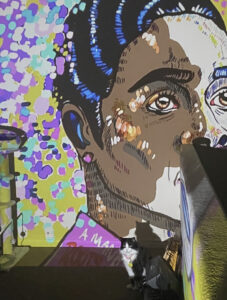Had a really nice meeting with Cezar, and showed him the things I have done during these two weeks including user testing, model building and report design. Cezar gave me so much positive feedback and also the inspiration he came up with.
We agreed that the report is the key, and talked about whether should I add the attractiveness score — Cezar suggested that I should only add it if I have a good conceptual reason to. If it’s more along the lines of “I could use one more stat on the report, what could it be?”, or “It’s easy to calculate an attractiveness score based on the data I get from the model”, he said it’s better not to have it, since it’s quite a charged metric, and might make viewers uncomfortable in ways I don’t intend. The mental health aspects are charged as well, but he thinks those are easier to fit into the framework of my project re: tone. However, if my reason is more along the lines of “Bank X uses an attractiveness metric when deciding how big of a credit limit to give clients, because attractiveness is correlated with wealth” or w/e, and I’m making a direct commentary on that, he would say it’s worth considering adding it, but be very careful with how I frame it, and make it obvious that it’s satire/commentary / etc.
As for the idea of making the system’s bias more obvious by giving it an internal state/emotion. which would make the scores be higher or lower, that could be simply a one-dimensional noise function that evolves over time, so the system has one emotion, let’s say valence, that’s more positive or negative, and drags the scores up or down with it. Of course, it could expand into multiple dimensions (e.g. valence – is it positive or negative? which could impact the scores; tension – is it angry or calm? which could impact word choices on the report, make the report feel more friendly or more aggressive, using just synonyms of the words I use for the metrics, etc.) Another way to model the emotion of the system could be as a running average based on the previous readings — let’s say if it had 3 people in a row with a high predicted success score, the system is excited about life and tends to be biased towards giving more positive scores, etc. Kinda similar to how priming the human brain works — like if I have 2 meetings one after another, and both of them feel super inspiring, I’m more likely to find the next meeting inspiring/exciting as well because I’m in the right head space for that. Just food for thought.
Later we talked about the technical part and he send me the wristband project he mentioned(with Ian Cheng),
this is a guided tour of that show, which shows that process as well. He also said if I need help for creating the printing system he would love to share the package with me which is sooooo nice:)))
 Class Playlist
Class Playlist 

 . It’s amazing to reflect on the journeys you’ve each been on!
. It’s amazing to reflect on the journeys you’ve each been on!